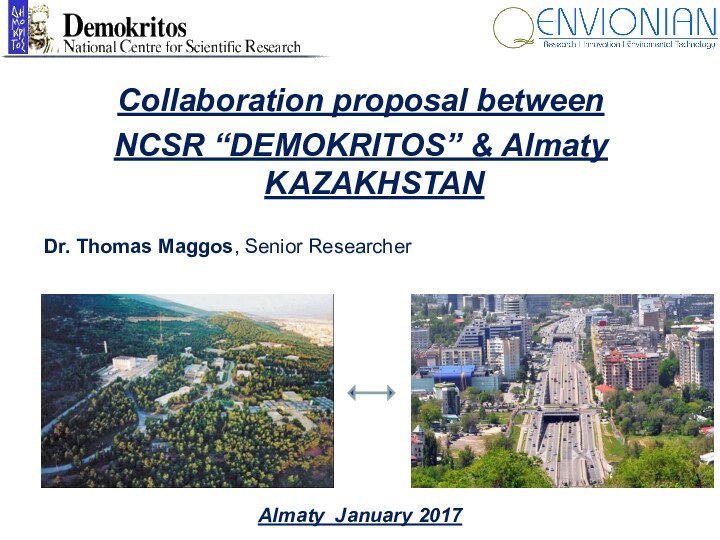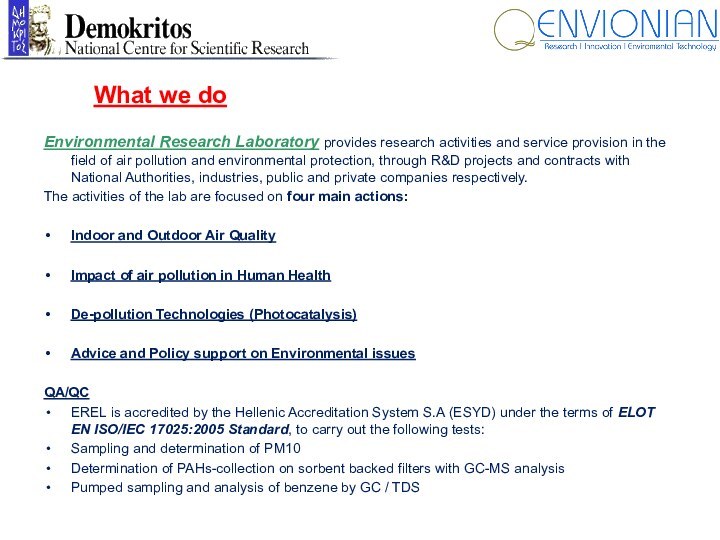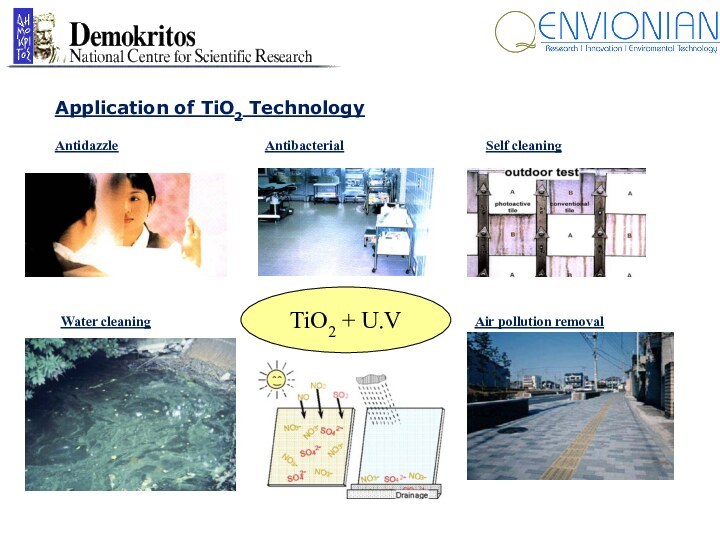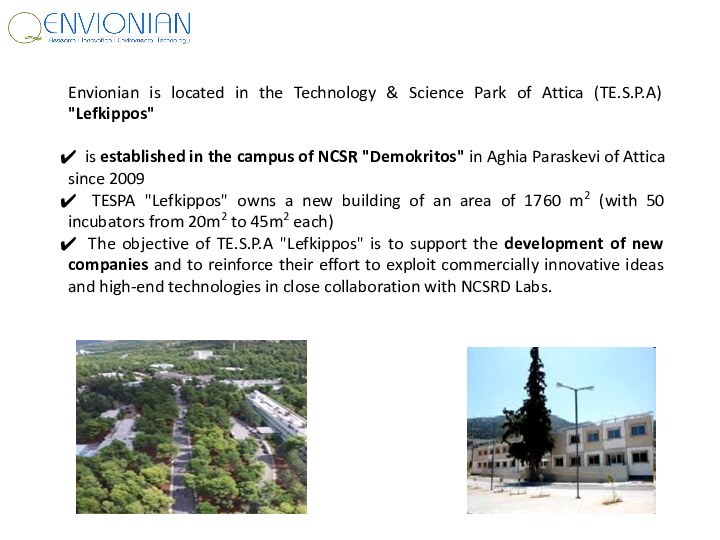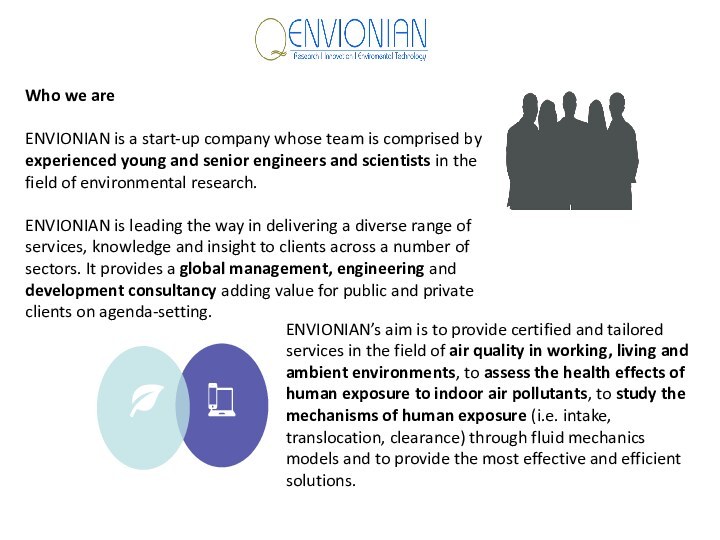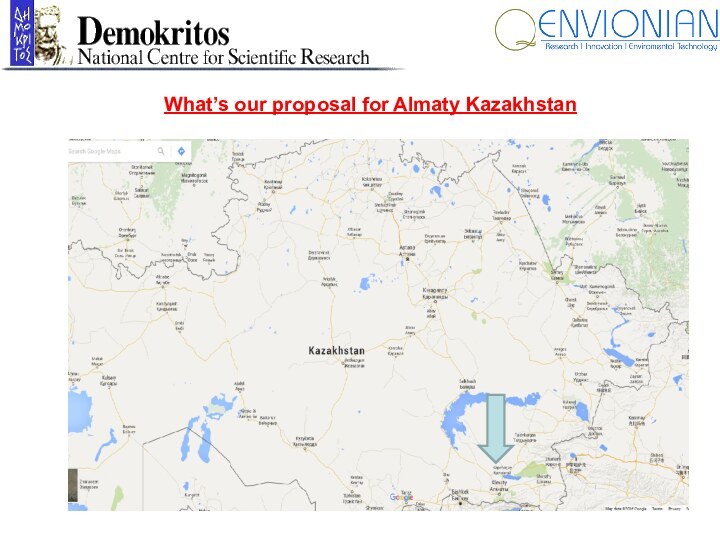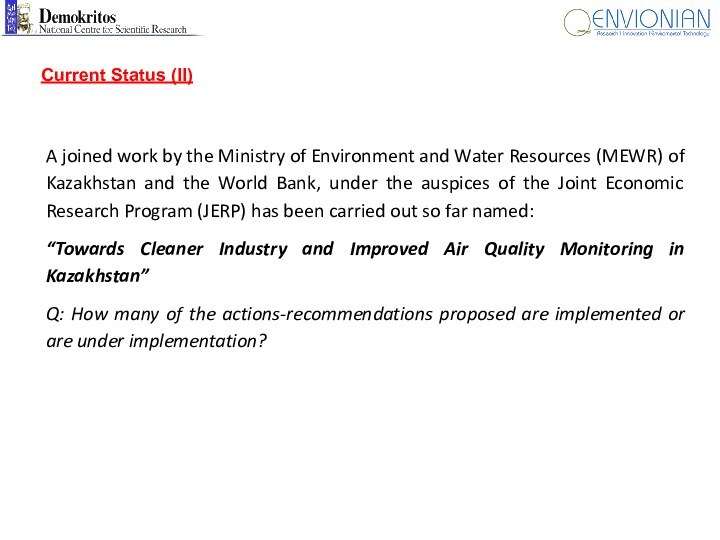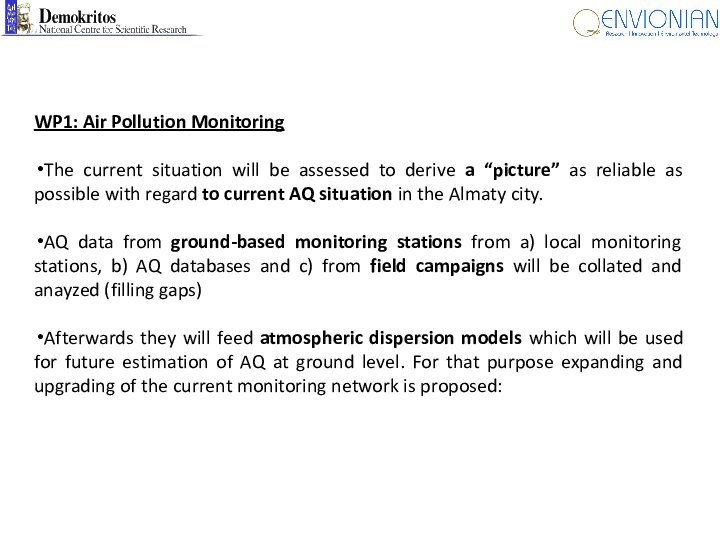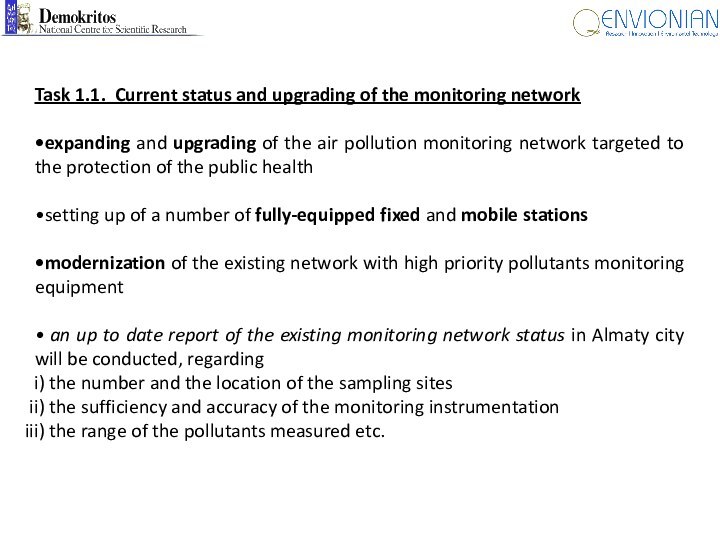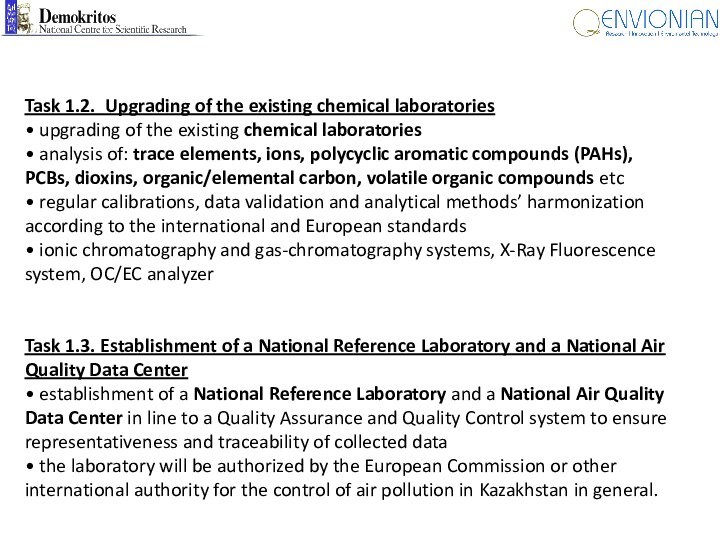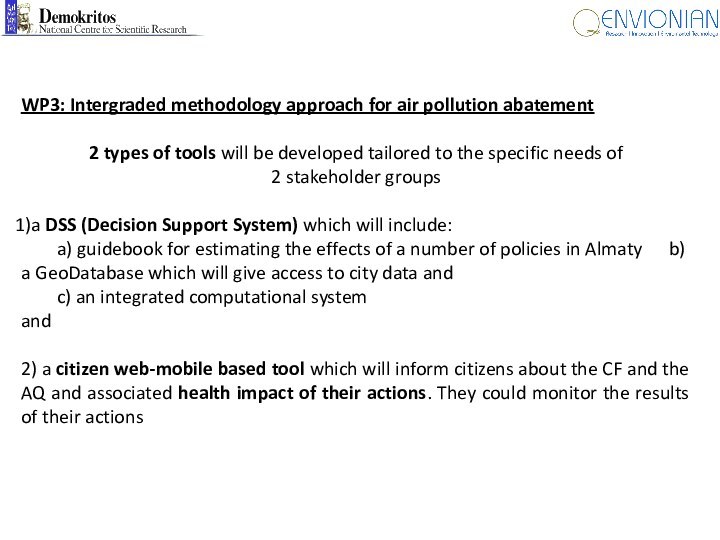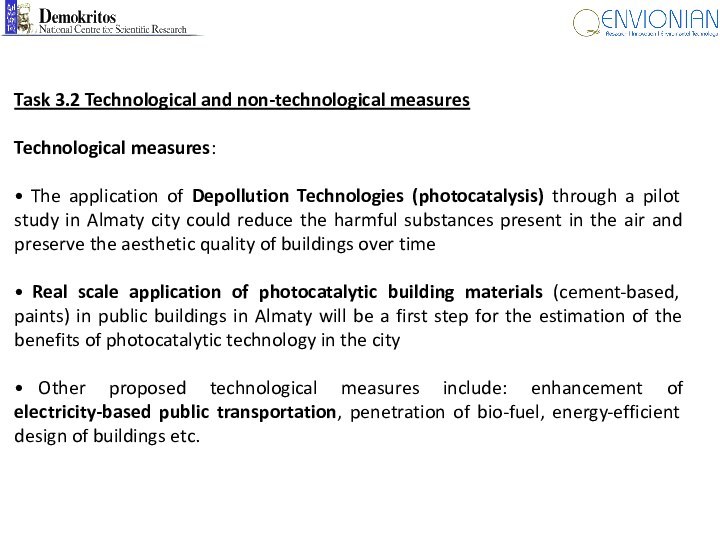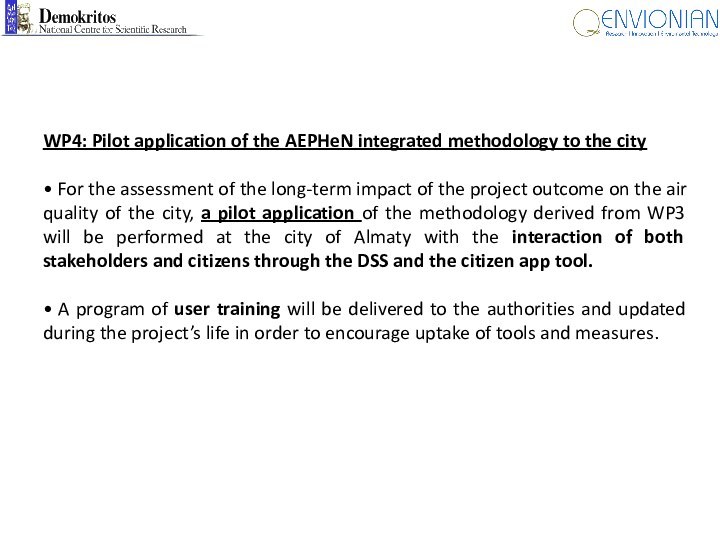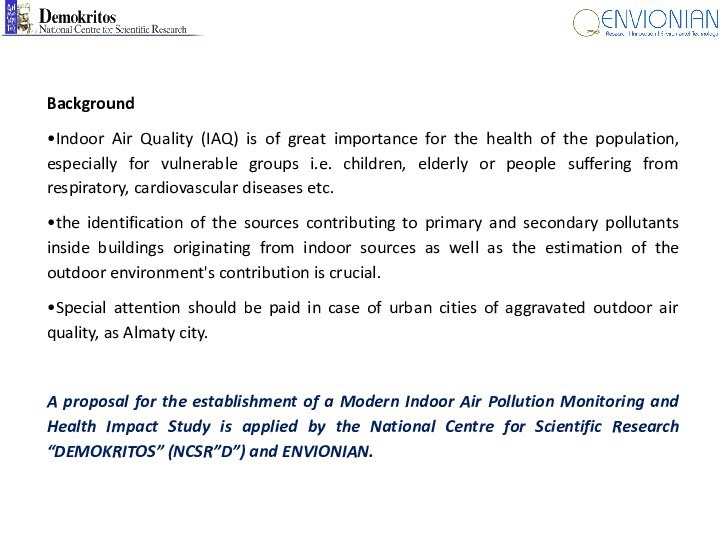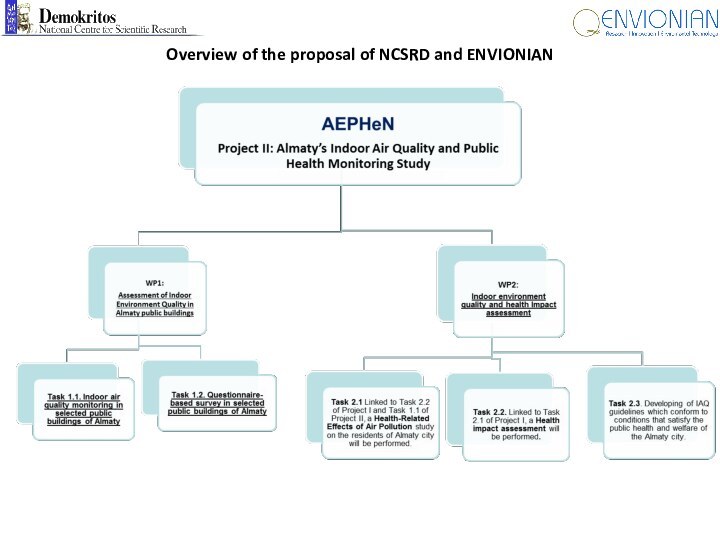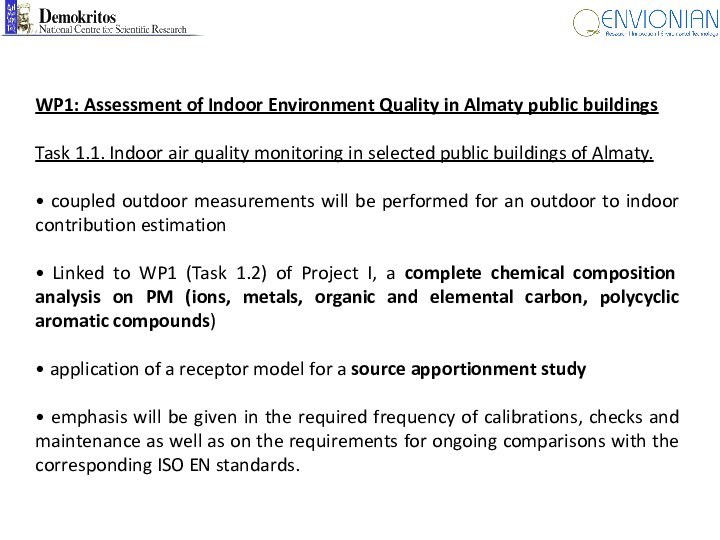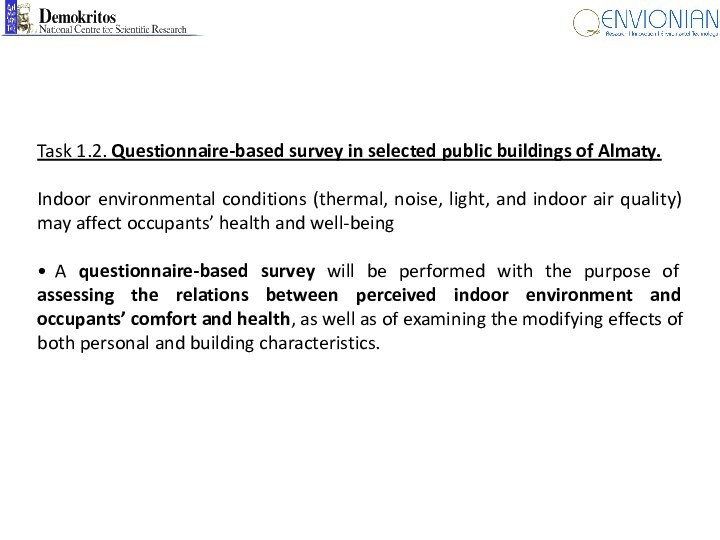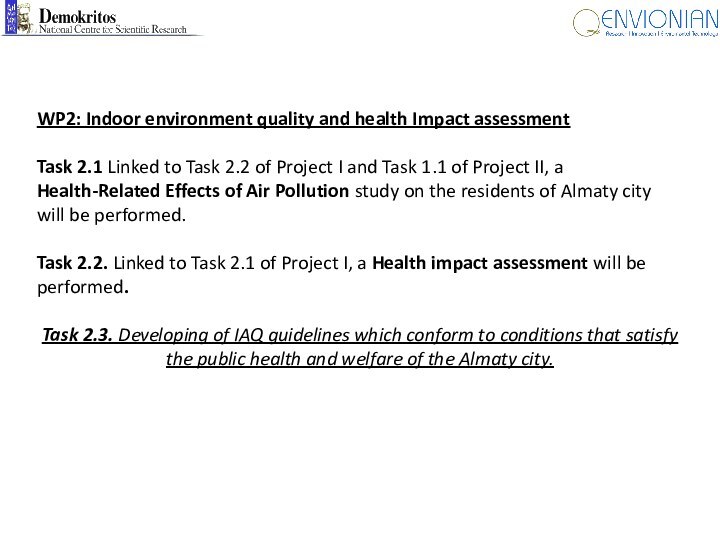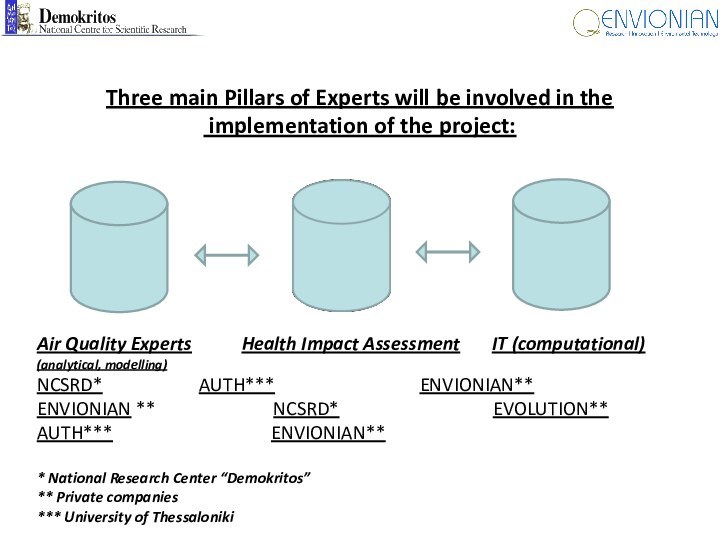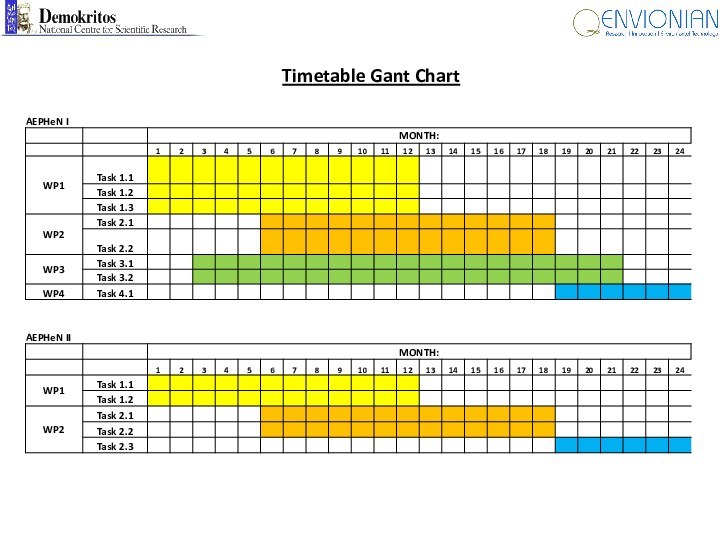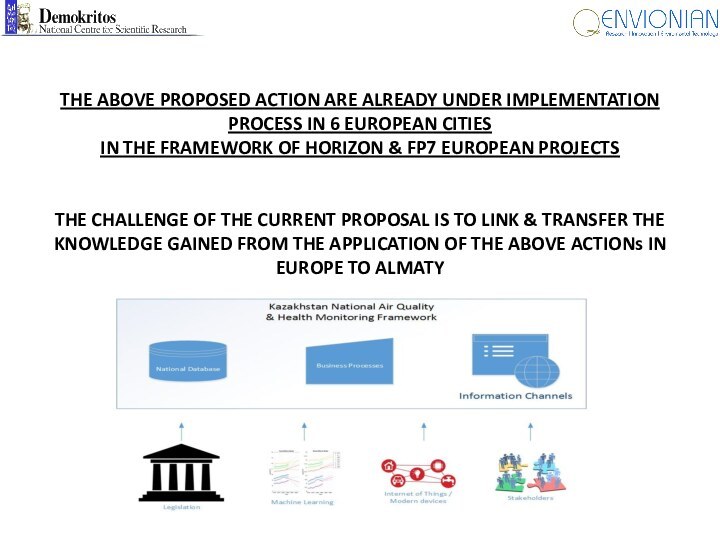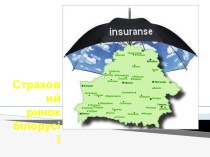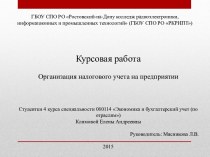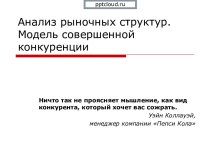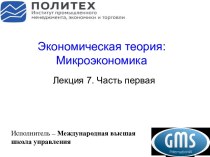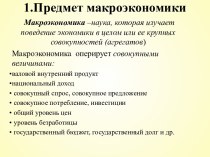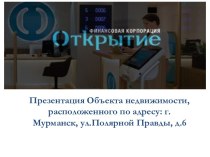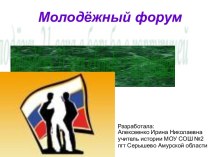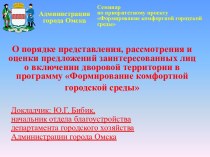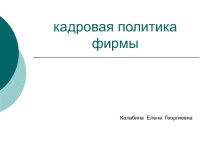Слайд 2
The National Centre for Scientific Research “Demokritos” (NCSRD)
is the largest and most acclaimed research center in
Greece, employing over 1,000 researchers, engineers, technicians and administrative personnel. It is a multidisciplinary research center focusing on several fields of natural sciences and engineering and hosting important laboratory national facilities. The main mission of the center is conduct of basic and applied research, develop specialized “know-how” and contribute to the social and economic development of the country, offer customized high technology services to the public and private sectors. The NCSR is a self-administered governmental legal entity, under the supervision of the General Secretariat of Research and Technology of the Ministry of Education, Research and Religious Affairs.
Who we are
Слайд 3
Environmental Research Laboratory provides research activities and service
provision in the field of air pollution and environmental
protection, through R&D projects and contracts with National Authorities, industries, public and private companies respectively.
The activities of the lab are focused on four main actions:
Indoor and Outdoor Air Quality
Impact of air pollution in Human Health
De-pollution Technologies (Photocatalysis)
Advice and Policy support on Environmental issues
QA/QC
EREL is accredited by the Hellenic Accreditation System S.A (ESYD) under the terms of ELOT EN ISO/IEC 17025:2005 Standard, to carry out the following tests:
Sampling and determination of PM10
Determination of PAHs-collection on sorbent backed filters with GC-MS analysis
Pumped sampling and analysis of benzene by GC / TDS
What we do
Слайд 4
Indoor and outdoor Air Quality
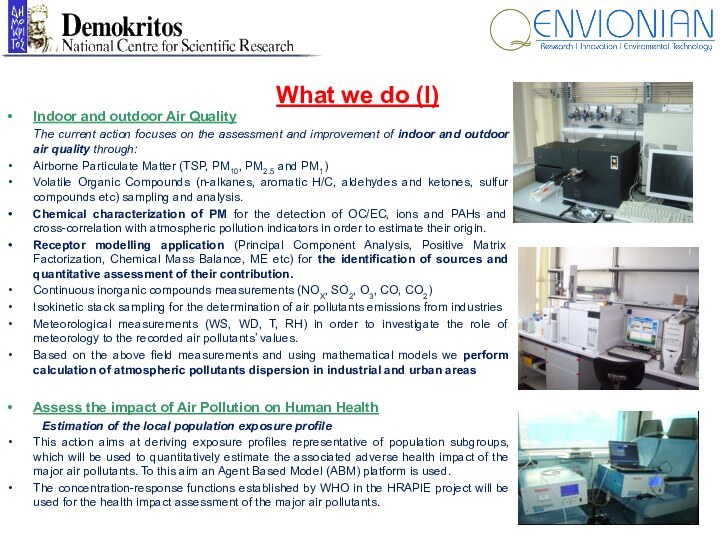
The current action focuses on the assessment and improvement
of indoor and outdoor air quality through:
Airborne Particulate Matter (TSP, PM10, PM2.5 and PM1)
Volatile Organic Compounds (n-alkanes, aromatic H/C, aldehydes and ketones, sulfur compounds etc) sampling and analysis.
Chemical characterization of PM for the detection of OC/EC, ions and PAHs and cross-correlation with atmospheric pollution indicators in order to estimate their origin.
Receptor modelling application (Principal Component Analysis, Positive Matrix Factorization, Chemical Mass Balance, ME etc) for the identification of sources and quantitative assessment of their contribution.
Continuous inorganic compounds measurements (NOX, SO2, O3, CO, CO2)
Isokinetic stack sampling for the determination of air pollutants emissions from industries
Meteorological measurements (WS, WD, T, RH) in order to investigate the role of meteorology to the recorded air pollutants’ values.
Based on the above field measurements and using mathematical models we perform calculation of atmospheric pollutants dispersion in industrial and urban areas
Assess the impact of Air Pollution on Human Health
Estimation of the local population exposure profile
This action aims at deriving exposure profiles representative of population subgroups, which will be used to quantitatively estimate the associated adverse health impact of the major air pollutants. To this aim an Agent Based Model (ABM) platform is used.
The concentration-response functions established by WHO in the HRAPIE project will be used for the health impact assessment of the major air pollutants.
What we do (I)
Слайд 5
What we do (II)
Photocatalysis (de-pollution technology)
This action, aims

to provide support to policy makers and authorities at
a regional and national level in relation to the large scale application of photo catalytic materials as a means for the improvement of the air quality in the coupled indoor – outdoor environment.
The photo catalytic remediation approach will be efficient in achieving levels of air quality that do not give rise to significant negative impacts and risk to human health and the environment.
By providing such an assessment, we will provide a basis for encouraging local authorities to adopt a more integrated approach to urban management by informing stakeholders to use those techniques and methods which have been positively assessed and have successfully been tested in projects for their performance. Thus, it constitutes a new, alternative means for the effective reduction of airborne agents in indoor and/or outdoor environments improving this way our day-to-day life, while at the same time contributing to coordinated efforts for the promotion of Innovative Clean Air Technologies.
The current action focuses on laboratory and real scale applications of innovative titanium dioxide containing materials for testing the degradation of air pollutants in the urban and indoor environment.
Слайд 6
APPLICATION OF TiO2 PHOTOCATALYTIC PROPERTIES ON ATMOSPHERIC DEPOLLUTION
The use of TiO2 in building matrix or surface
coating could
give to the material self cleaning and depolluting activities
Such materials, when exposed to solar UV rays, will act as a
catalyst for the photo induced decomposition of inorganic and
organic molecules adsorbed on its surface.
Photocatalysis by semiconductor particles provides a very promising solution for pollutants removal compared with other technologies
Pollutants are oxidized
Energetically interesting process:
It operates near ambient temperature
Use solar energy to initiate photocatalytic reactions
TiO2 is considered to be the most promising photo catalyst for
the treatment of air pollutants due to:
its highly strong oxidative ability even at low U.V irradiation
chemical stable material
non toxic
its very common and relative cheap
Слайд 7
TiO2 + U.V
Antidazzle
Water cleaning
Self cleaning
Air pollution removal
Antibacterial
Application of
TiO2 Technology
Слайд 8
Materials’ ability to degrade air pollutants are examined
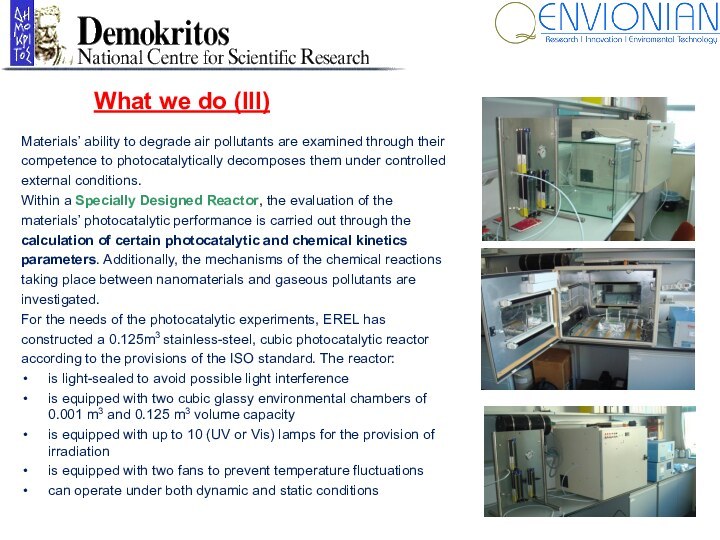
through their
competence to photocatalytically decomposes them under controlled
external conditions.
Within
a Specially Designed Reactor, the evaluation of the
materials’ photocatalytic performance is carried out through the
calculation of certain photocatalytic and chemical kinetics
parameters. Additionally, the mechanisms of the chemical reactions
taking place between nanomaterials and gaseous pollutants are
investigated.
For the needs of the photocatalytic experiments, EREL has
constructed a 0.125m3 stainless-steel, cubic photocatalytic reactor
according to the provisions of the ISO standard. The reactor:
is light-sealed to avoid possible light interference
is equipped with two cubic glassy environmental chambers of 0.001 m3 and 0.125 m3 volume capacity
is equipped with up to 10 (UV or Vis) lamps for the provision of irradiation
is equipped with two fans to prevent temperature fluctuations
can operate under both dynamic and static conditions
What we do (III)
Слайд 9
Participation in various European projects funded by EC
Ηorizon2020-SC5-04-2015
(Grant Agreement No 690105, 2016-2020): “Integrated Climate forcing and
Air pollution Reduction in Urban Systems” (ICARUS). Budget: 6.472.015,00 €.
FP7-ENV-2013 (Grant Agreement No 690105, 2013-2018) Health and Environment-wide Associations based on Large population Surveys (HEALS) Budget:11.514.483,78 €
FP7-REGPOT-2013 (Grant Agreement No 690105, 2013-2015) Enhancing the Capacity for Environmental Technology & Climate Research (EnTEC) Budget: 2.736.953,00 €.
FP7-REGPOT-2009 (Grant Agreement No 229773, 2009-2011) - Enhancing the Research Potential of the NCSR “Demokritos” Environmental Research Laboratory in the European, National and Regional Research Areas (PERL) Budget: 797.000,00 €.
Слайд 10
Participation in various European projects funded by
EC
CEN/TC264/WG15 (2013-2015) Standardization mandate to European Commission CEN, CENELEC
and ETSI in support of the Implementation of the Ambient Air Quality Legislation Budget: 390.000,00 €
LIFE+11-ENV (2012-2016) Testing and Development of air quality mitigation measures in Southern Europe (AIRUSE) Budget: 1,138,861 €
LIFE+09-ENV (2009-2014) Development of A Cost Efficient Policy Tool for reduction of Particulate Matter in AIR (ACEPT AIR) Budget: 836,449 €.
…and beyond EU
Ministry of Health, QATAR (2015) Provision of Consultancy Services and Analysis of Indoor and Outdoor Air monitoring stations’ filters in Doha, Qatar
Слайд 11
Technology & Science Park of Attica (TE.S.P.A) "Lefkippos“
NCSR
Demokritos, 15310 Aghia Paraskevi Attiki Greece
info@envionian.gr
Environment & Health company
Слайд 12
Envionian is located in the Technology & Science
Park of Attica (TE.S.P.A) "Lefkippos"
is established in
the campus of NCSR "Demokritos" in Aghia Paraskevi of Attica since 2009
TESPA "Lefkippos" owns a new building of an area of 1760 m2 (with 50 incubators from 20m2 to 45m2 each)
The objective of TE.S.P.A "Lefkippos" is to support the development of new companies and to reinforce their effort to exploit commercially innovative ideas and high-end technologies in close collaboration with NCSRD Labs.
Слайд 13
Who we are
ENVIONIAN is a start-up company whose
team is comprised by experienced young and senior engineers
and scientists in the field of environmental research.
ENVIONIAN is leading the way in delivering a diverse range of services, knowledge and insight to clients across a number of sectors. It provides a global management, engineering and development consultancy adding value for public and private clients on agenda-setting.
ENVIONIAN’s aim is to provide certified and tailored services in the field of air quality in working, living and ambient environments, to assess the health effects of human exposure to indoor air pollutants, to study the mechanisms of human exposure (i.e. intake, translocation, clearance) through fluid mechanics models and to provide the most effective and efficient solutions.
Слайд 14
Environmental Measurements
Machine Learning
Human Health
Research Projects
Development of Computational Tools
(Machine Learning System) for the on-line management of a
range of environmental parameters
Identification of air quality problems, performing comprehensive chemical analysis and suggestion of effective and efficient solutions to industry, government agencies and local authorities
Environmental research focused on air quality and health related effects
Management of European and national research projects
What we do
ENVIONIAN main activities are focused on:
Elaboration and implementation of research and innovation activities;
Consultation on governmental research and innovation policy issues;
Слайд 15
ENVIONIAN also provides:
Development of an Integrated Air
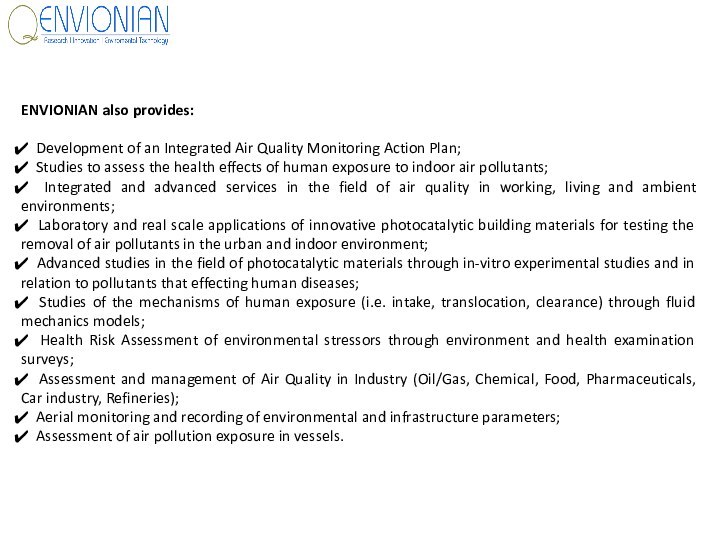
Quality Monitoring Action Plan;
Studies to assess the health
effects of human exposure to indoor air pollutants;
Integrated and advanced services in the field of air quality in working, living and ambient environments;
Laboratory and real scale applications of innovative photocatalytic building materials for testing the removal of air pollutants in the urban and indoor environment;
Advanced studies in the field of photocatalytic materials through in-vitro experimental studies and in relation to pollutants that effecting human diseases;
Studies of the mechanisms of human exposure (i.e. intake, translocation, clearance) through fluid mechanics models;
Health Risk Assessment of environmental stressors through environment and health examination surveys;
Assessment and management of Air Quality in Industry (Oil/Gas, Chemical, Food, Pharmaceuticals, Car industry, Refineries);
Aerial monitoring and recording of environmental and infrastructure parameters;
Assessment of air pollution exposure in vessels.
Слайд 16
Clients
ENVIONIAN develops a broad range of cooperation with
Public and Private Organizations in Greece and abroad, such
as:
Industry: Oil/Gas, Chemical, Food, Pharmaceuticals, Car industry, Refineries;
Public & Private Organizations, Environmental & other related Agencies;
Public authorities: Ministry of Environment, Ministry of Employment, Ministry of Economy, Municipalities, Regions, General Chemical State Lab., Greek Universities and Research Centers
Technology & Science Park of Attica (TE.S.P.A) "Lefkippos“, NCSR Demokritos, 15310 Aghia Paraskevi Attiki Greece
00306977390796
info@envionian.gr
www.envionian.gr
Contact:
Слайд 17
What’s our proposal for Almaty Kazakhstan
Слайд 18
Almaty’s Environmental and Public Health Network (AEPHeN)
Project I:
Almaty’s Outdoor Air Quality and Public Health Monitoring Network
Слайд 19
Background
The Almaty city is characterized by heavy local
pollution and increased smog due to its complex terrain,
frequent thermal inversions together with the atmospheric pollutant emissions produced by around 1.5 million inhabitants of the city.
Main pollution sources: emissions from energy production, industrial processes and vehicular exhaust emissions (gas, coal and diesel combustion).
Currently measured pollutants (particulate matter-PM10, NO2, CO and heavy metals) frequently exceed the EU limit values, implying the necessity for immediate mitigation actions.
Current Status (I)
Слайд 20
A joined work by the Ministry of Environment
and Water Resources (MEWR) of Kazakhstan and the World
Bank, under the auspices of the Joint Economic Research Program (JERP) has been carried out so far named:
“Towards Cleaner Industry and Improved Air Quality Monitoring in Kazakhstan”
Q: How many of the actions-recommendations proposed are implemented or are under implementation?
Current Status (IΙ)
Слайд 21
The establishment of a modern Outdoor Air Pollution
Monitoring and Health Impact Network which will support :
DSS
(Decision Support System) for the local authorities which will analyze and propose technological and non-technological measures and policy options for air pollution abatement
Cloud based tool to inform citizens of environment-conscious alternatives
that may have a positive impact on air quality and finally on their health and motivate them to adopt alternative behaviors
The above project is proposed to be applied by the National Centre for Scientific Research “DEMOKRITOS” (NCSR”D”) and ENVIONIAN.
Aim of the project
Слайд 23
Implementation chart of the proposal
Слайд 24
WP1: Air Pollution Monitoring
The current situation will be
assessed to derive a “picture” as reliable as possible
with regard to current AQ situation in the Almaty city.
AQ data from ground-based monitoring stations from a) local monitoring stations, b) AQ databases and c) from field campaigns will be collated and anayzed (filling gaps)
Afterwards they will feed atmospheric dispersion models which will be used for future estimation of AQ at ground level. For that purpose expanding and upgrading of the current monitoring network is proposed:
Слайд 25
Task 1.1. Current status and upgrading of the
monitoring network
expanding and upgrading of the air pollution monitoring
network targeted to the protection of the public health
setting up of a number of fully-equipped fixed and mobile stations
modernization of the existing network with high priority pollutants monitoring equipment
an up to date report of the existing monitoring network status in Almaty city will be conducted, regarding
the number and the location of the sampling sites
the sufficiency and accuracy of the monitoring instrumentation
the range of the pollutants measured etc.
Слайд 26
pre-existing and new stations:
at focal and representative sites
within the city
high resolution automatic instrumentation for the monitoring
of particulate matter (PM1, PM2.5, PM10 and TSP fractions), volatile organic compounds as well as inorganic gases (O3, NOx, SO2, CO)
according European Directives (ISO, EN)
an open-access monitoring network will be established so as to achieve public and stakeholders’ immediate information about short-term air pollution episodes
With the use of cutting edge information technology methods, safe data transport from the data acquisition systems in the field to the public and policymaking professionals will be achieved.
Слайд 27
Task 1.2. Upgrading of the existing chemical laboratories
upgrading of the existing chemical laboratories
analysis of:
trace elements, ions, polycyclic aromatic compounds (PAHs), PCBs, dioxins, organic/elemental carbon, volatile organic compounds etc
regular calibrations, data validation and analytical methods’ harmonization according to the international and European standards
ionic chromatography and gas-chromatography systems, X-Ray Fluorescence system, OC/EC analyzer
Task 1.3. Establishment of a National Reference Laboratory and a National Air Quality Data Center
establishment of a National Reference Laboratory and a National Air Quality Data Center in line to a Quality Assurance and Quality Control system to ensure representativeness and traceability of collected data
the laboratory will be authorized by the European Commission or other international authority for the control of air pollution in Kazakhstan in general.
Слайд 28
WP2: Health Impact Assessment for the population of
Almaty
Field campaigns with individual sensors will take place to
derive detailed time activity patterns at individual level. Then will be coupled to air pollutants concentrations derived from WP1 in order to assess individual exposure profile through ABM.
Furthermore SES info will be collected through questionaries (during the field campaigns) in order to derive exposure profile for vulnerable population subgroups.
Refined approaches including human respiratory tract (HRT) deposition modeling (for PM, MH, PAHs) and (PBTK/BBDR) models will be applied to finally estimate health impact
Слайд 29
Task 2.2. Pilot study on the Health-Related Effects
of Air Pollution on the residents of Almaty city
suitable candidate sensor technologies to be used by volunteers, will be selected based on the NCSR”D” reviews and preliminary trials of instrument reliability and utility (GPS-enabled personal sensors, remote sensing etc)
A data collection tool will be developed in order to store and manage all data coming from different devices
agent-based modelling (ABM) will be used, informed from the collected multi-sensor data to capture individual spatio-temporal behaviours and to model individual exposure.
Слайд 30
WP3: Intergraded methodology approach for air pollution abatement
2
types of tools will be developed tailored to the
specific needs of
2 stakeholder groups
a DSS (Decision Support System) which will include:
a) guidebook for estimating the effects of a number of policies in Almaty b) a GeoDatabase which will give access to city data and
c) an integrated computational system
and
2) a citizen web-mobile based tool which will inform citizens about the CF and the AQ and associated health impact of their actions. They could monitor the results of their actions
Слайд 31
Task 3.1 Air pollution prediction and prevention solution.
Based
on the state of the art of the Artificial
Intelligence Technology, this activity aims at building a system that by combining information collected by the National Air Quality Data Center and different models will be able to:
a) predict the severity of air pollution and
b) suggest remediation actions in order to reduce impact on the environment and on the population (for example by restricting number of permitted vehicles in circulation etc).
c) predict the impact of AEPHeN proposed measures or policies
This system that will be based on the innovative technologies of the Internet of Things (IoT), will position Kazakhstan as a World Wide Level Center of Excellence in Government digitization for control Air Quality and Health quality in general.
Слайд 32
Task 3.2 Technological and non-technological measures
Technological measures:
The application of Depollution Technologies (photocatalysis) through a
pilot study in Almaty city could reduce the harmful substances present in the air and preserve the aesthetic quality of buildings over time
Real scale application of photocatalytic building materials (cement-based, paints) in public buildings in Almaty will be a first step for the estimation of the benefits of photocatalytic technology in the city
Other proposed technological measures include: enhancement of electricity-based public transportation, penetration of bio-fuel, energy-efficient design of buildings etc.
Слайд 33
Task 3.2 Technological and non-technological measures
Non
technological measures:
Measures concerning transportation domain (access limitations
zones to city centers, taxation based on emissions, intelligent traffic management systems)
urban planning domain (establishment of low emission zones, design of additional green spaces within the city)
residential domain (public awareness about energy conservation
eco-labelling of energy efficient/environment-friendly products
Слайд 34
WP4: Pilot application of the AEPHeN integrated methodology
to the city
For the assessment of the long-term
impact of the project outcome on the air quality of the city, a pilot application of the methodology derived from WP3 will be performed at the city of Almaty with the interaction of both stakeholders and citizens through the DSS and the citizen app tool.
A program of user training will be delivered to the authorities and updated during the project’s life in order to encourage uptake of tools and measures.
Слайд 35
Almaty’s Environmental and Public Health Network (AEPHeN)
Project II:
Almaty’s Indoor Air Quality and Public Health Monitoring Study
Слайд 36
Background
Indoor Air Quality (IAQ) is of great importance
for the health of the population, especially for vulnerable
groups i.e. children, elderly or people suffering from respiratory, cardiovascular diseases etc.
the identification of the sources contributing to primary and secondary pollutants inside buildings originating from indoor sources as well as the estimation of the outdoor environment's contribution is crucial.
Special attention should be paid in case of urban cities of aggravated outdoor air quality, as Almaty city.
A proposal for the establishment of a Modern Indoor Air Pollution Monitoring and Health Impact Study is applied by the National Centre for Scientific Research “DEMOKRITOS” (NCSR”D”) and ENVIONIAN.
Слайд 37
Overview of the proposal of NCSRD and ENVIONIAN
Слайд 38
WP1: Assessment of Indoor Environment Quality in Almaty
public buildings
Task 1.1. Indoor air quality monitoring in selected
public buildings of Almaty.
extended campaign of indoor air quality assessment in selected Almaty’s buildings used by the citizens
priority will be given to buildings occupied by vulnerable population groups (children, elderly and sick people): schools, hospitals, public buildings etc.
A number of fully-equipped monitoring stations for the indoor measurement of high priority pollutants (PM10, PM2.5, PM1, volatile organic compounds, carbonyls, phthalates, inorganic compounds, mold, etc.) and other parameters (temperature, humidity, ventilation)
Слайд 39
WP1: Assessment of Indoor Environment Quality in Almaty
public buildings
Task 1.1. Indoor air quality monitoring in selected
public buildings of Almaty.
coupled outdoor measurements will be performed for an outdoor to indoor contribution estimation
Linked to WP1 (Task 1.2) of Project I, a complete chemical composition analysis on PM (ions, metals, organic and elemental carbon, polycyclic aromatic compounds)
application of a receptor model for a source apportionment study
emphasis will be given in the required frequency of calibrations, checks and maintenance as well as on the requirements for ongoing comparisons with the corresponding ISO EN standards.
Слайд 40
Task 1.2. Questionnaire-based survey in selected public buildings
of Almaty.
Indoor environmental conditions (thermal, noise, light, and
indoor air quality) may affect occupants’ health and well-being
A questionnaire-based survey will be performed with the purpose of assessing the relations between perceived indoor environment and occupants’ comfort and health, as well as of examining the modifying effects of both personal and building characteristics.
Слайд 41
WP2: Indoor environment quality and health Impact assessment
Task 2.1 Linked to Task 2.2 of Project I
and Task 1.1 of Project II, a Health-Related Effects of Air Pollution study on the residents of Almaty city will be performed.
Task 2.2. Linked to Task 2.1 of Project I, a Health impact assessment will be performed.
Task 2.3. Developing of IAQ guidelines which conform to conditions that satisfy the public health and welfare of the Almaty city.
Слайд 42
Three main Pillars of Experts will be involved
in the
implementation of the project:
Air Quality Experts
Health Impact Assessment IT (computational)
(analytical, modelling)
NCSRD* AUTH*** ENVIONIAN**
ENVIONIAN ** NCSRD* EVOLUTION**
AUTH*** ENVIONIAN**
* National Research Center “Demokritos”
** Private companies
*** University of Thessaloniki
